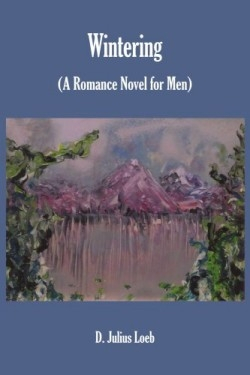Wintering
(A Romance Novel For Men)
*One’s destination is never a place but a new way of looking at things. —*Henry Miller
Wintering follows a middle-age painter who has jettisoned messy romantic entanglements in the city for a period of regrouping in rural Washington. The unnamed protagonist is charmed by wood stove heat but not too impressed with the country neighbors who see him as a foreign diversion. It seems that a great deal of what he hoped to evade is still with him.
A nice comic touch is Oscar a dog whom the Humane Society staffer warns has “bad habits.” The canine self-indulges incessantly “‘Because he can.’” The protagonist establishes a sexual relationship with the staffer known through the book only as “the lady in black glasses.” There is no love or even friendship between them and the possibility of violence hovers close from the first visit when she kicks Oscar. The coupling is without commitment expanding to a strangely unsatisfying three with the inclusion of the lady in black glasses’ traditionally attractive friend Kara. Even so the protagonist fears repercussions when he quietly begins to date Janice a less disturbed woman. Should he be honest with black glasses or leave town instead? “She would probably find him here kick in the door and slam his head into a wall a couple of times. Afterwards they would probably make love.”
The move to the country is an escape to emptiness. The protagonist’s occupation isn’t mentioned until most of the way through and his daily activities are minimal. Although the story is set after the demise of telephone party-lines someone else (who eventually gains the moniker “The Voice”) is always on his line when the protagonist tries to make a call. At first the two are adversarial but the protagonist comes to question himself and The Voice turns existentialist therapist: “‘You describe these events like they happened to you. Were you there or not?’” A gutsy late-book twist regarding the disembodied guide dares readers to make a tremendous leap.
Those readers who were irritated as children by the similarly nameless Man in the Yellow Hat from the Curious George books should steel themselves. The lack of names for most of the important characters reveals their status as symbols or archetypes. Statements on the interplay between men and women favor a view of “romance” which expects imperfect connection superficiality or failure in the long run. An unapologetic masculine perspective shades the meaning of love and the importance of sex. The protagonist’s nature practically guarantees that women close to his persistent ideal are fated to cycle through a preordained process.
Those courageous enough to read the oxymoronic subtitle but still open Wintering won’t be sorry. D. Julius Loeb is a painter a builder and a lover of many women. He blazes new trails in exploration of detachment and the necessary rediscovery of the honest self. His previous novel is Satisfaction: A Love Story About Physics. This recommended read can be consumed in one sitting so go ahead set aside an evening.
Disclosure: This article is not an endorsement, but a review. The publisher of this book provided free copies of the book and paid a small fee to have their book reviewed by a professional reviewer. Foreword Reviews and Clarion Reviews make no guarantee that the publisher will receive a positive review. Foreword Magazine, Inc. is disclosing this in accordance with the Federal Trade Commission’s 16 CFR, Part 255.

